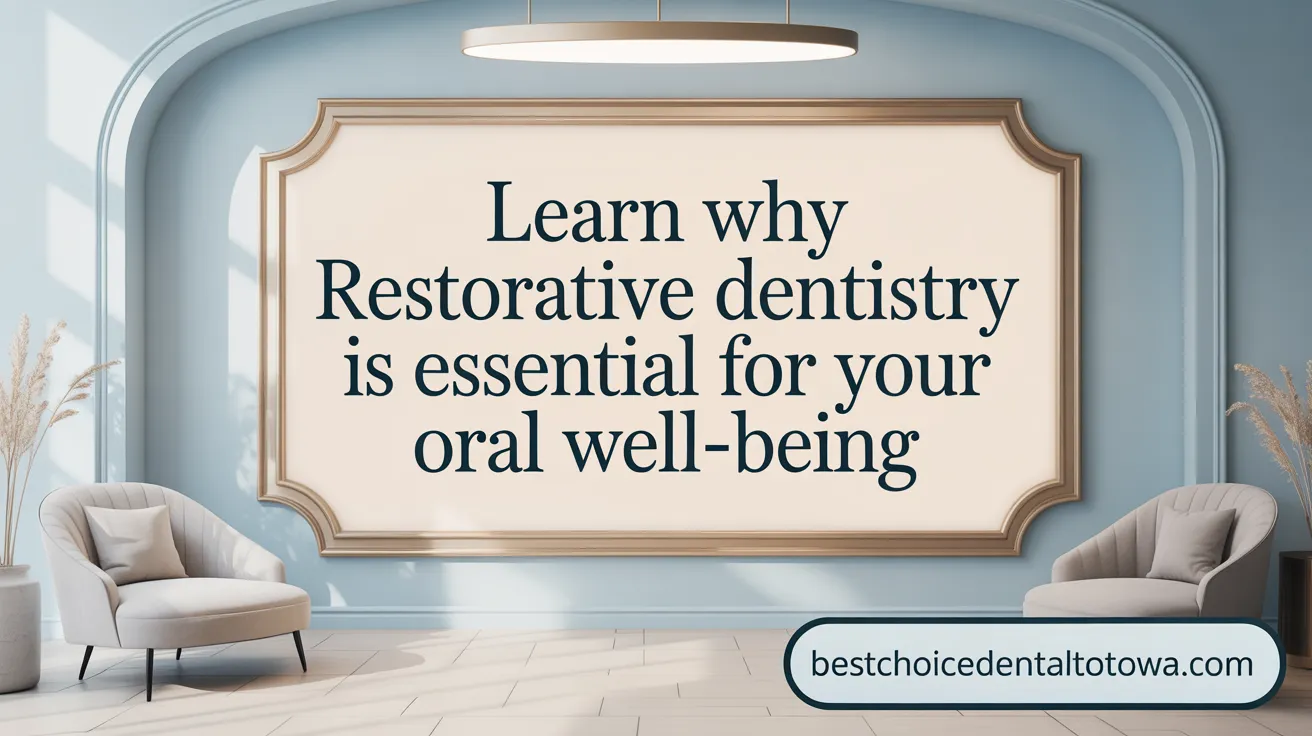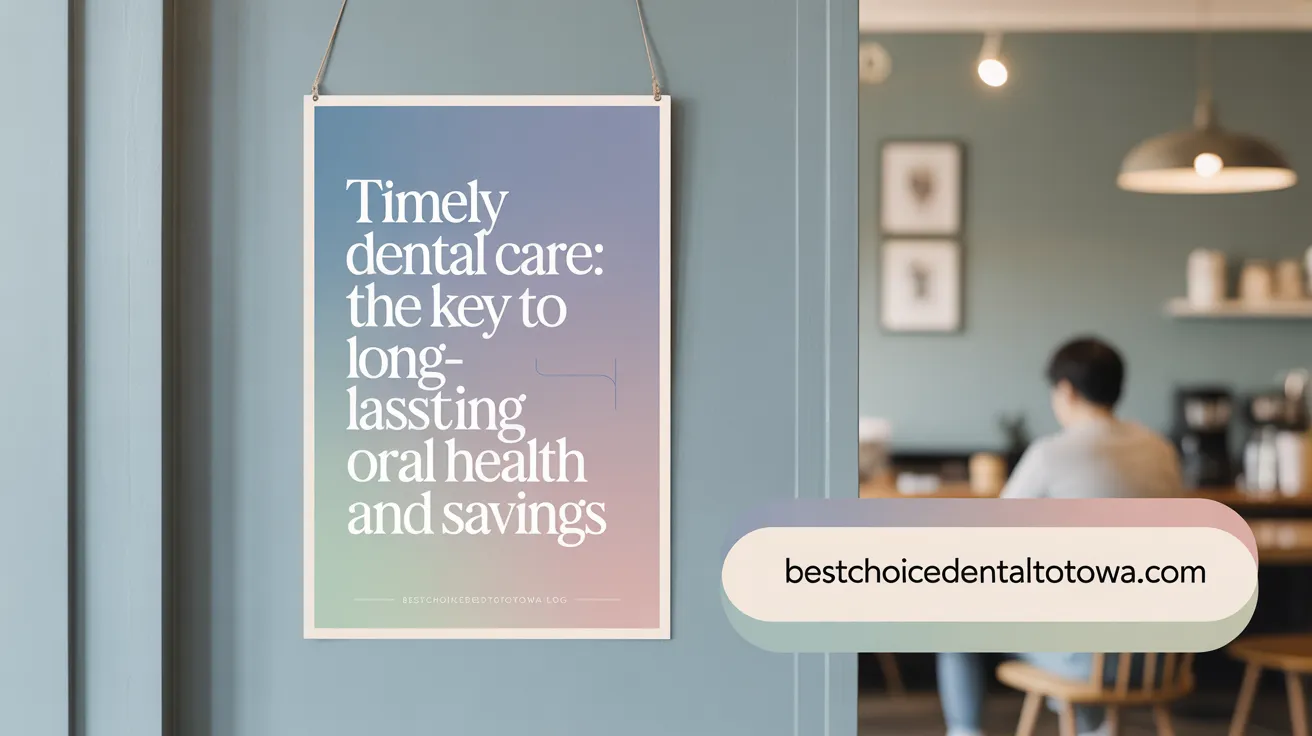Understanding Restorative Dentistry and Its Vital Role
Restorative dentistry focuses on repairing and replacing damaged or missing teeth to restore oral health, function, and aesthetics. This branch of dental care is essential for maintaining proper chewing, speaking, and smiling functions. Beyond aesthetics, restorative treatments protect against future complications like infections and bone loss, safeguarding oral integrity and boosting overall well-being.
What Is Restorative Dentistry and Why Is It Crucial for Oral Health?

What is restorative dentistry, and why is it important for maintaining oral health and function?
Restorative dentistry is a vital branch of dental care dedicated to repairing damaged teeth and replacing missing teeth. Its primary goal is to restore the mouth's health, stability, and appearance, ensuring patients can chew, speak, and smile confidently.
Common restorative procedures
Restorative treatments include a variety of procedures like dental fillings, crowns, bridges, dental implants, dentures, and root canal therapy. Fillings repair cavities caused by decay, preventing further damage. Crowns cover and strengthen broken or heavily decayed teeth, returning them to their natural function. Bridges fill gaps left by missing teeth by anchoring artificial teeth to adjacent natural teeth. Dental implants involve placing titanium posts into the jawbone to support crowns or bridges, closely mimicking natural teeth. Dentures are removable replacements for full or partial tooth loss. Root canal therapy removes infected pulp tissue, disinfects, and seals the tooth to prevent further infection.
Importance for oral health and functionality
Restorative dentistry is essential not just for restoring teeth but also for maintaining overall oral health. By stabilizing teeth, these procedures prevent further decay, gum disease, and bone loss. They restore proper bite alignment, which is crucial for efficient chewing and speech.
Moreover, these treatments help improve aesthetic appearance, boosting self-esteem. Early intervention reduces the need for more invasive, costly treatments later, making restorative dentistry a proactive approach to long-term oral health. Whether it’s minimizing discomfort or preventing future dental issues, restorative dentistry plays a key role in helping patients retain their natural teeth and enjoy a healthier, more functional smile.
For more details
Search for "restorative dentistry procedures and importance" to explore the latest techniques and benefits associated with these essential dental services.
Comprehensive Overview of Restorative Procedures and Their Benefits
 Restorative dentistry encompasses a wide range of treatments designed to repair or replace damaged or missing teeth, thereby restoring oral health, function, and aesthetics. The primary procedures include dental fillings (such as amalgam or composite resin) for cavities, crowns to cover and protect damaged teeth, bridges to fill gaps from missing teeth, and dental implants which replace tooth roots with titanium posts supporting crowns or bridges. Dentures offer a removable solution for extensive tooth loss, while inlays and onlays are used for larger cavities that are not suitable for fillings but do not require crowns. Root canal therapy addresses infected pulp tissue and often leads to restoring the tooth with a crown for added strength.
Restorative dentistry encompasses a wide range of treatments designed to repair or replace damaged or missing teeth, thereby restoring oral health, function, and aesthetics. The primary procedures include dental fillings (such as amalgam or composite resin) for cavities, crowns to cover and protect damaged teeth, bridges to fill gaps from missing teeth, and dental implants which replace tooth roots with titanium posts supporting crowns or bridges. Dentures offer a removable solution for extensive tooth loss, while inlays and onlays are used for larger cavities that are not suitable for fillings but do not require crowns. Root canal therapy addresses infected pulp tissue and often leads to restoring the tooth with a crown for added strength.
The materials used in these treatments vary, including durable ceramics, zirconia, metal alloys, and composite resins. Modern techniques leverage digital imaging, CAD/CAM design, and advanced bonding agents to ensure precise, long-lasting restorations.
The benefits extend beyond mere appearance; these procedures significantly improve chewing ability, speech, and overall oral function. They help eliminate pain, prevent further dental deterioration, and reduce future treatment needs. Aesthetic enhancements through restorations boost patient confidence by restoring a natural-looking smile. Overall, restorative treatments are essential for maintaining long-term oral health and quality of life.
Preventing Future Dental Problems Through Timely Restoration
 Restorative dental procedures are vital for safeguarding oral health and preventing a cascade of future dental problems. When teeth are damaged by decay, cracks, or trauma, prompt restoration helps seal and protect the affected areas, significantly reducing the risk of bacteria entering and causing further decay or infections. Filling cavities with suitable materials like composite resin or amalgam not only restores the tooth but also prevents the decay process from worsening.
Restorative dental procedures are vital for safeguarding oral health and preventing a cascade of future dental problems. When teeth are damaged by decay, cracks, or trauma, prompt restoration helps seal and protect the affected areas, significantly reducing the risk of bacteria entering and causing further decay or infections. Filling cavities with suitable materials like composite resin or amalgam not only restores the tooth but also prevents the decay process from worsening.
Missing teeth pose a different risk, as gaps can lead to neighboring teeth shifting, creating misalignment and disrupting the bite. Such malocclusions can cause uneven wear, jaw pain, and difficulties in chewing or speaking. Restoring missing teeth through options like dental implants or bridges stabilizes the dental arch, maintaining proper alignment and preventing additional dental complications.
A crucial aspect of dental restoration is the role of implants in preserving jawbone health. When a tooth is lost, the underlying jawbone begins to deteriorate—a process known as bone resorption—potentially compromising facial structure and causing sunken cheeks. Dental implants, which replace the tooth root, provide stimulation to the jawbone, promoting bone preservation and preventing resorption.
Early intervention is essential because each day a damaged or missing tooth remains untreated increases the likelihood of more complex issues. Timely dental restoration not only alleviates pain and restores functionality but also ensures the long-term health of your teeth and jawbone (Why You Shouldn't Wait to Restore Damaged Teeth).
In summary, through early and appropriate restoration, dentists can effectively prevent further damage, support the structural integrity of the mouth, and maintain both oral and overall health. Prompt treatment preserves teeth, prevents debilitating conditions, and ultimately contributes to a healthier, more confident smile (Benefits of Restorative Dentistry).
Enhancing Aesthetics, Confidence, and Quality of Life
Restorative dentistry plays a vital role in transforming not just oral health but also a person's appearance and self-esteem. By repairing or replacing damaged, decayed, or missing teeth with natural-looking restorations such as crowns, veneers, bridges, and implants, it significantly improves dental aesthetics. These enhancements lead to brighter, more attractive smiles, which in turn boost individual confidence and self-esteem.
When teeth are restored to look natural, individuals often feel more comfortable smiling, speaking, and eating in social settings. This increased confidence can positively influence social interactions and professional opportunities, fostering a more vibrant and engaged lifestyle.
Beyond physical appearance, restorative dentistry has profound psychological benefits. The reduction of self-consciousness associated with dental imperfections encourages a more positive self-image. Patients report feeling happier and more confident after their treatments, which can decrease anxiety and promote a healthier mental state.
Moreover, the overall well-being of individuals is enhanced through these procedures. Restorations improve essential functions like chewing and speaking, contributing to better nutrition and health. Preventing ongoing dental issues also reduces chronic pain and prevents systemic health problems associated with poor oral health, such as cardiovascular disease and diabetes.
In summary, restorative dentistry not only reconstructs oral function and health but also significantly improves aesthetic appeal and emotional confidence. This comprehensive benefit structure enhances overall quality of life, helping individuals lead more confident, healthier, and socially active lives.
The Importance of Prompt Treatment and Long-Term Advantages

Why early intervention matters
Acting quickly to repair damaged or decayed teeth is crucial for maintaining overall oral health. Prompt treatment helps prevent minor dental issues from escalating into serious problems, such as infections, severe decay, or tooth loss. Immediate care ensures that conditions like chips, cracks, or cavities are addressed before they cause additional damage, reducing the need for more invasive and costly procedures in the future.
Timely interventions, such as fillings or crowns, restore the natural structure of teeth and support proper function. They also help preserve the aesthetics of the smile, which can significantly influence confidence and social interactions. Moreover, early treatment minimizes discomfort and prevents symptoms like pain, sensitivity, or swelling from worsening.
Cost-effectiveness and prevention of complex issues
Fixing dental problems early is financially smarter. Addressing issues promptly reduces the risk of complications that might require extensive treatments, such as root canals, extractions, or implants. It saves patients time and money by avoiding prolonged dental work and possible multiple visits.
Prevention through timely restoration also reduces the chances of developing secondary conditions like gum disease or jawbone deterioration. These issues can compromise overall oral health and require complex, expensive solutions if not caught early.
Long-term health and social benefits
Long-term, receiving prompt dental care supports sustained oral health and overall well-being. Restoring teeth early helps maintain proper bite alignment, facial structure, and jawbone integrity.
Healthy teeth and gums contribute to better nutrition by allowing comfortable chewing and speaking. They also boost self-esteem by improving smile appearance, which can positively affect social and professional life.
Additionally, maintaining good oral health reduces systemic health risks. Untreated dental infections are linked to conditions such as heart disease, diabetes, and respiratory illnesses. Early treatment and ongoing dental care thus provide holistic health benefits that extend beyond the mouth.
In summary, the benefits of addressing dental issues promptly are clear: they prevent complex future problems, support long-term health, and enhance quality of life.
Embracing Restorative Dentistry for a Healthier Future
Restorative dentistry is a cornerstone of modern oral health care, offering solutions that go beyond repairing teeth to enhancing quality of life, self-confidence, and overall well-being. By understanding its diverse procedures, benefits, and the importance of prompt action, individuals can make informed choices about their dental care. Timely restorations not only protect against further dental complications but also preserve natural teeth and support vital functions such as chewing and speaking. Ultimately, investing in restorative dentistry is an investment in a healthier, more vibrant smile and a better quality of life for the long term.
